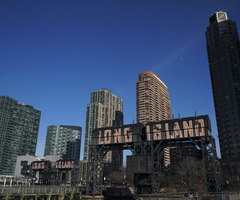MI SELECCIÓN DE NOTICIAS
Noticias personalizadas, de acuerdo a sus temas de interés

Are New Yorkers better off after Amazon’s decision Thursday to cancel its planned headquarters in the Queens neighborhood of Long Island City? It’s a complicated question, weighing the benefits of new high-earning residents against the added strain on local services. Yet the pullout could lead to a decisive triumph for taxpayers across the nation, as city and state officials start to reckon with the popular backlash against corporate tax incentives.
From the day Amazon announced the new headquarters last November, city and state officials drew widespread criticism for offering Amazon $3 billion in tax breaks. Newly elected Rep. Alexandria Ocasio-Cortez lamented the huge giveaway “at a time when our subway is crumbling,” and hundreds of locals packed into town meetings in the following weeks to condemn the city’s private deal-making. Unlike previous cases of lavish incentive packages, the terms of the Amazon deal were eye-popping enough to draw potent skepticism even before any sign that the company might not live up to its hiring and spending commitments.
The skeptics are on to something. Since the first boom of company-specific tax breaks in the U.S. during the early 1990s, there has been no correlation between such incentives and a region’s wage and unemployment levels, according to a comprehensive 2017 study by economist Timothy J. Bartik. Luring a big company to town with tax breaks often produces meager results even when the company hires and spends as much as expected, explains the Tax Foundation’s Jared Walczak. “All of these new costs are being subsidized by existing incumbent taxpayers,” he says. Residents and other businesses bear a disproportionate burden of added public costs.
For mayors and governors, the chance to brag about bringing jobs to town has more than made up for the perverse consequences of company-specific tax breaks. But now, after Amazon’s pullout from New York-along with recent high-profile busts in deals with Foxconn in Wisconsin and General Electric in Massachusetts-the public appeal of tax lures is likely to diminish.
Witness the pronounced wariness of tax incentives among candidates in next week’s special election for New York City public advocate, the office second in line to the mayor and the springboard from which Bill de Blasio was elected in 2013. “I think we have to re-evaluate what incentives look like,” says former City Council Speaker Melissa Mark-Viverito in an interview. She criticizes Mr. de Blasio’s closed-door approach to the Amazon deal, and she promises to revisit corporate-incentive practices that “have been on the books for years.” State Assemblyman Ron Kim, also a Democrat, goes even further, insisting that government “shouldn’t be picking winners and losers.” On the day Amazon announced its withdrawal, Mr. Kim introduced legislation that will prohibit New York from offering company-specific tax breaks if at least one other state commits to do so as well.
Yet progressive candidates talking tough about the harms of corporate tax incentives are likely setting themselves up for disappointment once elected, because the problem of tax incentives starts with high taxes. Democrat-run states like Connecticut and New Jersey watch businesses flee punishing corporate and property tax rates, and then resort to targeted tax breaks to draw new ones or retain incumbents.
This relationship between high taxes and targeted incentives seems to be lost on blue-state progressives. New York Gov. Andrew Cuomo defends the $3 billion offer to Amazon as a worthwhile investment at the same time he accuses lower-tax states of “stealing” New York’s residents and jobs. New Jersey Gov. Phil Murphy, who last month convened a task force to audit the state’s tax-incentive program, is slightly wiser. But Mr. Murphy has already raised taxes on businesses and high earners in his first year in office.
As these leaders struggle to sort out their priorities, the backlash against tax incentives continues to build. State legislators are not likely to tie their hands by committing to an interstate anticompetitive pact, but opponents of corporate tax giveaways will remember the victory in New York. Activists will be spurred in future fights by Ms. Ocasio-Cortez’s declaration Thursday that their uprising defeated “corporate greed” and “worker exploitation.” But even as activists oppose uneven rewards, they’ll likely attempt to mete out more punishment to everyone via higher taxes.
Anticorporatism is driving the current wave of resistance to tax incentives, which means fiscally responsible leaders face both an opportunity and a challenge. Rather than stoke fears about the harms of big business, they’ll have to channel anger about corporate welfare toward lowering tax rates for firms large and small. States with lower, flatter taxes have managed to draw national businesses in recent years while still providing fertile conditions for local firms to grow. And though it may be hard for a politician to believe, a voter at the polls is likelier to remember the job he landed at a thriving medium-size firm than watching his mayor cut a ribbon at the paid-for facility of a corporate newcomer.
Mr. Ukueberuwa is an assistant editorial features editor at the Journal.
By Mene Ukueberuwa
La producción total de cereales de China alcanzó un nuevo récord este año, con un aumento de 1,2% respecto al año pasado, hasta los 714,9 millones de toneladas
Según datos de Bloomberg, desde el primero hasta el 26 de diciembre, el peso colombiano tuvo una apreciación de 3,2%
Las maniobras comenzaron 11 días después de que Estados Unidos anunciara la venta de armas a Taiwán por valor de US$11.100 millones